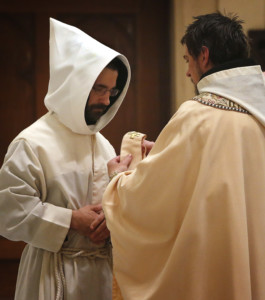Vocations
First of all, God must call a man to the monastic life. This is perhaps obvious, but often overlooked. How does one know if God is calling him to religious life?
There are many signs that give the first indication. Perhaps one is drawn to quiet prayer alone with God. Perhaps one receives inspiration reading or hearing the lives of the saints. Sometimes a person make a radical conversion from a sinful life and in doing so conceives a desire to make up lost time in a radical gift of self to God. Or, perhaps a priest, nun or lay person suggests that one would make a good monk.
However the first indications come about, one important first step is to begin praying with a live religious community. It is a temptation today to think long and hard about many different communities, but this almost inevitably frustrates the seeker from having too many choices and not enough direction.
It is very helpful to seek out a good spiritual director at this time, but it is not necessary. Most important is to visit a community or two and learn about their specific way of life up close. A community that one already knows and finds attractive in some way is more likely to be the place where we are called than the yet-unknown community that we haven’t met.
Getting to Know Monastic Life
When a young man asks to visit us as a possible vocation candidate, we offer him hospitality in our guest house. He can meet with a monk or two to discuss what the life is like. Most importantly, he is invited to pray the Divine Office with us and to share meals with us. If, in the opinion of the community, it seems possible that God is calling him to our life, we invite him for a longer stay.
After some time getting to know each other, the candidate (often invited by the community to do so) makes a formal application to enter the life. If this is accepted, a time for entrance into the postulancy is set. The postulancy lasts between two and six months and is a time of separation from the world, a time of particular silence and intense prayer.

At the end of the postulancy, the candidate is clothed with the novice’s habit and enters the novitiate. Our novitiate, a time of study of theology and the learning of monastic practices, lasts for two years. During this time, the novice’s candidacy is formally evaluated three times. If the three evaluations a favorable, the candidate is invited to petition the community to make temporary profession.
Temporary profession, or ‘simple vows’ is made for a period of three years. On the day of this profession, the man becomes a monk in the eyes of the Church. The monk in simple vows is called a ‘junior’ and continues his studies while partaking more intimately in the decision-making and work of the community.
After three years, the junior monk may ask the community to receive his Solemn Vows. Solemn Vows consecrate a man for life in service to the Church as a monk. The day of vows is one of tremendous joy, a real time of arrival at full brotherhood with the community. A senior monk possesses full rights in community decision-making. He receives the full habit, including the cowl (or cuculla) to be worn at the liturgy.
Candidates need to be in good physical and mental health, between twenty and thirty-five years of age. Exceptions are possible, but they normally require a greater period of time for initial discernment.
Interested in Learning More?
For more information about vocations to our monastery, please contact our Vocations Director Prior Peter Funk at vocations@chicagomonk.org.
For photos of our way of life, click here for our Instagram page.
